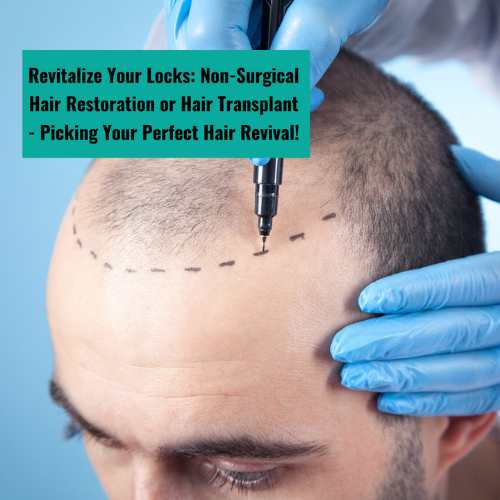Working Time
Book Appointment
Learn about the options available for restoring lost hair and choosing the best option for you. Discover the benefits and drawbacks of non-surgical hair restoration and hair transplantation.
Importance of Hair for Self-Image
Hair loss can lead to decreased self-esteem and negative self-image. Many people with hair loss or thinning hair feel less confident than they did when they had a full head of hair. It can be challenging to find hairstyles that work, and some may even avoid social situations due to hair loss.
Non-Surgical Hair Restoration
Explanation of Non-Surgical Methods
Non-surgical hair restoration is a process that uses different techniques to make your hair look fuller, healthier, and more youthful. It includes hair growth serums, oral supplements, and low-level laser therapy. These treatments are non-invasive and have no side effects.
Benefits and Drawbacks of Non-Surgical Options
Non-surgical hair restoration options give natural-looking results without any downtime or scarring. However, the effects are temporary, and the treatments need to be conducted regularly.
Hair Transplant
What is a Hair Transplant?
A hair transplant is a surgical procedure that involves removing hair follicles from one area of the scalp and transplanting it to another. It is an outpatient procedure that can take several hours. Hair transplants are permanent.

-
Procedure and Recovery Process
- The surgeon will numb the scalp with a local anesthetic and transplant the hair follicles to the bald or thinning areas. After the procedure, patients should avoid strenuous activity, sun exposure, and alcohol for a few days. Recovery can take up to six months.
- Hair transplants give natural-looking hair growth and permanent results. However, the surgery carries some risks, such as infection, scarring, and bleeding. Hair transplant is relatively expensive than non-surgical hair restoration
Pros and Cons of Hair Transplant
- Success rates and long-term outcomes
- Cost and financing options (insurance vs. personal payment)
- Surgical vs. non-surgical options
- Pre-existing medical conditions and medications
- Patient's scalp donor area and amount of hair follicles available to transplant
The Psychology Behind Hair Restoration
-
Stress
- Hair loss can cause psychological stress and anxiety. Treating hair loss can reduce stress levels.
- A full head of hair can boost your self-esteem. Hair restoration helps people feel great about themselves.
- iHair loss is associated with ageing. Hair restoration is a way to maintain a youthful look.
Some natural remedies can help prevent hair loss and promote new hair growth, such as coconut oil, aloe vera, and onion juice. However, these home remedies are not scientifically proven to work. DIY hair restoration is not recommended as a substitute for professional medical treatment.
Conclusion
With so many hair restoration options available, it is essential to weigh the pros and cons before deciding on a course of treatment. If you're considering non-surgical hair restoration or a hair transplant, consult with a hair-restoration specialist to determine the best option for you. You deserve to feel confident and happy with your appearance, and the right hair revival can help get you there.Call us at 9703463227 or schedule your appointment ONLINE.
